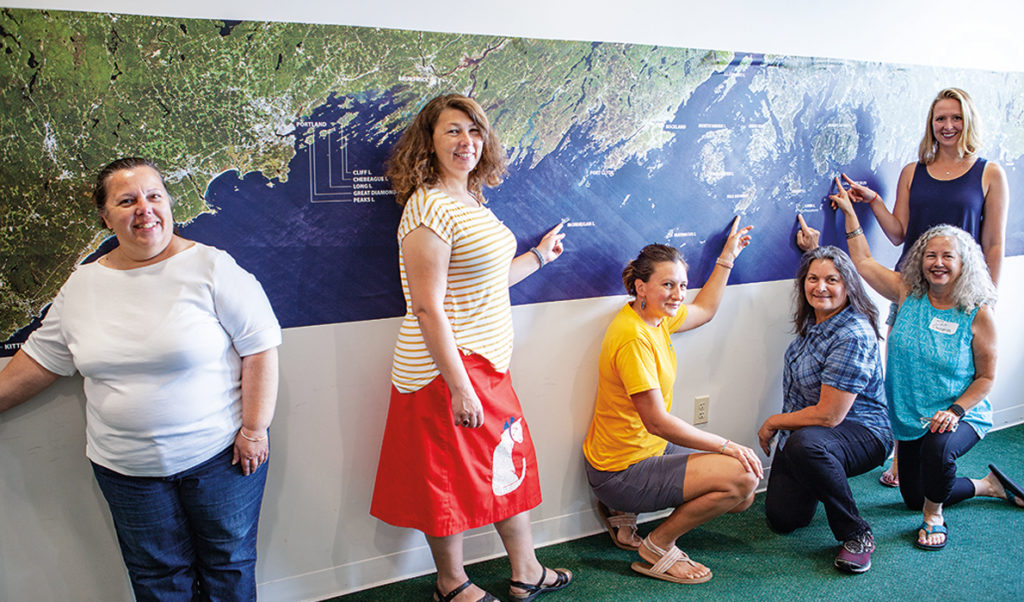By Yvonne Thomas
What has allowed the Outer Islands Teaching and Learning Collaborative, or TLC, to survive and thrive? For 10 years, the one- and two-room schools on Cliff Island, the Cranberry Isles, Frenchboro, Isle au Haut, Matinicus, and Monhegan have banded together through this network, creating, according to its mission statement, “a lifeline of support for students and teachers.”
Ten years may not seem like a long time, but in the education world, initiatives come and go more quickly. The success of this endeavor has come in being both stable and nimble in the face of nearly constant change—from new state mandates and district requirements, to teacher and administrator turnover, to shifting student needs.
What these smallest of schools have accomplished, both on their own, and as the TLC, is remarkable.
One of the reasons for the TLC’s success is that it started out as a true grassroots initiative, founded by a group of visionary and dedicated teachers. As the internet was beginning to make video conferencing and document sharing accessible and practical, these isolated teachers recognized the potential benefits of supporting each other as professionals and saw the learning opportunities that ongoing connection and collaboration could provide for their students.
With help from the Sea Coast Mission, School Reform Initiative, Island Institute, and other resources, the teachers put their considerable intellect, experience, and tenacity to work and created the TLC. Some of the Island Institute’s Island Fellows helped increase the capacity of the group and led to the creation of an aligned three-year rotating curriculum and provided critical support early on. A few years later, the TLC became one of the Island Institute’s signature education projects.
The mission of the TLC is simple and enduring: to sustain our one- and two-room island schools. And it’s working. Years ago, one of the original TLC schools was threatened with closure due to low enrollment. That school is now on solid ground and has recently maintained a steady, sustainable level of enrollment.
Other TLC schools have faced school closure threats over the years too, but so far, they have all remained open, even when there may not be any students for a period of time. In fact, in the past couple of years, the TLC has grown to include the island of Cuttyhunk, the only one-room island school in Massachusetts, which graduated its only student in June. That school is now transitioning into a STEAM (science, technology, engineering, arts, and mathematics) academy, offering week-long place-based learning intensives for local schools.
Another factor in the TLC’s success is its design, which includes five foundational elements that have provided the bedrock upon which the TLC is built and rebuilt every year, depending on the needs of the students, district expectations, and the availability of ever-improving technology.
- Teacher collaboration through in-person and virtual professional development.
- Academic collaboration through virtual book groups and science and social studies projects.
- Social collaboration through virtual parties and an inter-island student council group.
- Community support through parent and administrator involvement, and approval of the annual school budget.
The most fun, and to many the most important part of the TLC is the face-to-face interactions through in-person, curriculum-driven field trips. As one TLC student put it: “The strength of the TLC is that it brings together kids who don’t have many other kids in their community, which I enjoy. At the end of all the field trips, we play capture that flag which is a good way to wrap!”
The two annual field trips are in the fall and spring. The effort involved in getting multiple island school groups off their islands and coordinated at a mainland location (this fall we are heading to Washington County!) requires significant time and planning but the value of being all together is worth it.
After a recent field trip, one parent summed it up: “At a big spaghetti dinner that multiple teachers and parents from multiple island prepared, I looked around the room and realized that every table was a total mix of parents, teachers, and students from different islands. No one just sat with people from their island, because they were all a part of the same community. The TLC!”
This year, we welcomed two new-to-the-TLC teachers at our TLC Teacher Retreat in August and have a few new student faces in some schools. The busy fall flurry of field trips and school visits is on and we are setting our sights on a celebration/reunion for the TLC during our 2020 Spring Field Trip.
Our tenth year promises to be another good one, full of change and consistency, supported by proven systems and held up by the amazing TLC teachers.
Yvonne Thomas is a community development office, education specialist at the Island Institute, publisher of The Working Waterfront.





